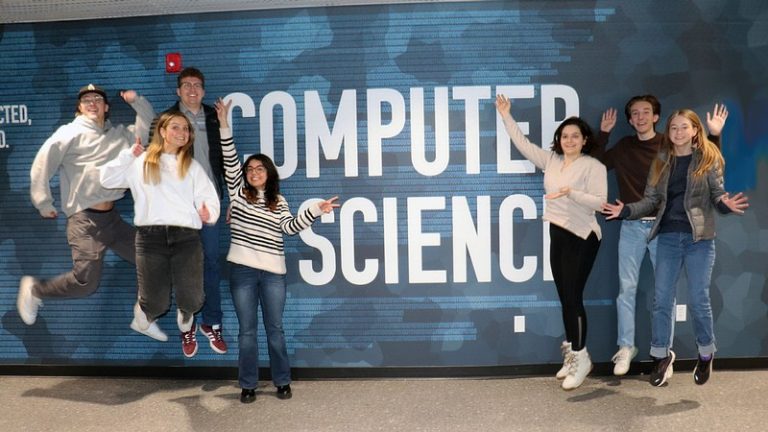Xiaojun Qi, computer scientist at Utah State University, director of USU Department of Computer Sciencecelebrates not only the department’s newly renovated offices and spaces in the Engineering Science Research Building, but also the department’s impressive list of recent accomplishments.
“As an Accreditation Board for Engineering and Technology (ABET) accredited program since 1998, the Department of Computer Science has achieved excellent success in securing grants and creating an environment for learning and increasingly innovative research,” Qi said. “We are full of enthusiasm as we enter a new year.”
Over the past four years, USU computer scientists have secured competitive funding to work on more than 30 projects involving more than 70 students. These projects encompass cutting-edge AI technologies applied to a wide range of applications, including predicting solar energetic particle events, understanding photospheric vector magnetic field parameters during solar flares, improving the quality of teaching programming, detecting insider threats and automating transportation solutions for people. living with a disability.
To celebrate, the department invites the USU campus community to a grand opening celebration from 1 to 3 p.m. on Friday, Jan. 17, in the Computer Science Student Lounge on the first floor of the SER Building.
The gathering includes a ribbon-cutting ceremony with Dean of Science Michelle Baker, Project Manager Amanda Thomson-Maughan and Qi at 2:30 p.m., as well as tours, games, activities, prizes and tacos. Participants are invited to RSVP.
“We invite everyone to join us and experience our new collaboration spaces, which encourage interdisciplinary projects and provide creative learning and research spaces for researchers from all disciplines,” says Qi. “Our new location embraces USU’s entrepreneurial spirit and will propel us toward exciting new opportunities.”
The Computer Science Research and Learning Labs, located on the first floor of the SER Building, include the Computer Science Education Lab (CSE), the Data Science and Applications Lab (DSA), the Computer Science Lab data mining (DM), the artificial intelligence (AI) laboratory. , the Privacy Lab, design and user experience; the High Computing (CE) Lab, the Visualization and Mixed Reality Lab (VizUS), the Collaborative Lab, and the Robotics Lab.
“The first floor also houses our Computer Science Mentoring Center, as well as our new Computer Science Venture classroom, known as ‘The Garage,’” she explains.
Qi notes that a number of notable IT companies and businesses started in modest garages.
“Hence the name: we have created a space that will encourage researchers to dream, to think, to tinker, to share ideas, to think and to invent,” she says.
The department hosts an 18-credit Technology Enterprise Sandbox program, designed to foster entrepreneurship and innovation in collaboration with USU’s Departments of Data Analytics and Information Systems and Electrical and Computer Engineering .
“This program provides students with unprecedented opportunities to embrace the entrepreneurial spirit by working to create large-scale, commercially viable software products and launching companies based on these products,” says Qi. “It is a hands-on approach designed to allow students to experience a concept from initial idea to market. »
The department also offers courses and degree programs covering software, web and mobile application development; data science, data analysis, machine learning, data mining, security and privacy, computer vision, computer science education, artificial intelligence, high performance computing, virtual reality, scientific and information visualization, and robotics.
“This is a very exciting and pivotal time for the computing world,” says Qi. “Along with a rigorous technical curriculum, our faculty encourages the development of ethical leadership and social responsibility. We encourage students not only to develop technical excellence, but also to think about what it means to be an ethical leader who can responsibly navigate a complex technology landscape.
Through labs and student organizations including the Robotics Lab, Free Software and Linux Club (FSLC), and USU’s Association for Computing Machinery-Women (ACM-W) student chapter , USU computer scientists are actively involved in community outreach. This includes hosting learning activities at monthly Science Unwrapped events and working with K-12 students throughout the local community.
“We place a strong emphasis on community engagement, collaboration, and actively work to inspire the next generation of scientists and engineers,” says Qi. “Our goal is to advance the field of computer science, while making it accessible, inclusive and enriching for all members of our community. »


